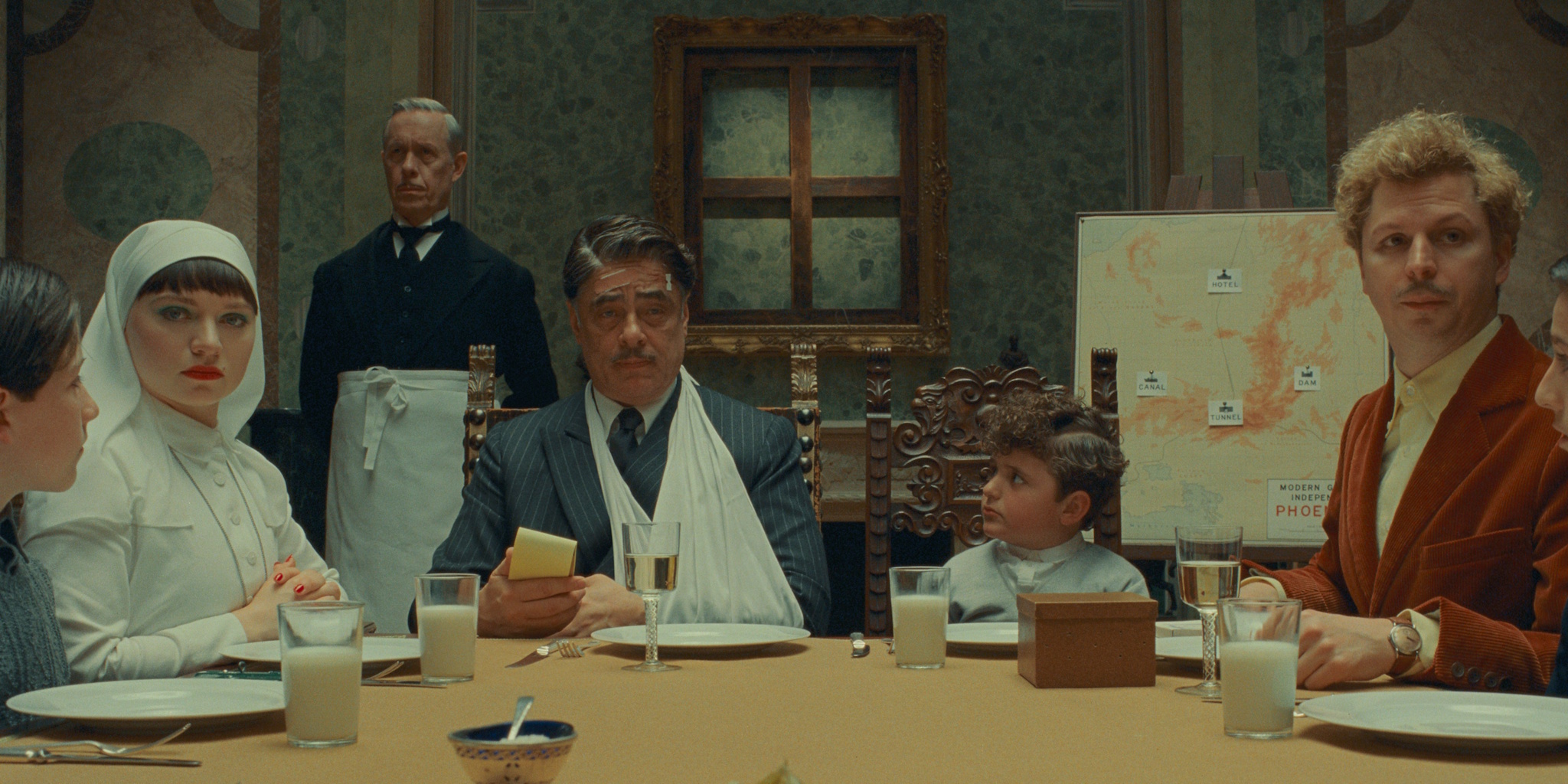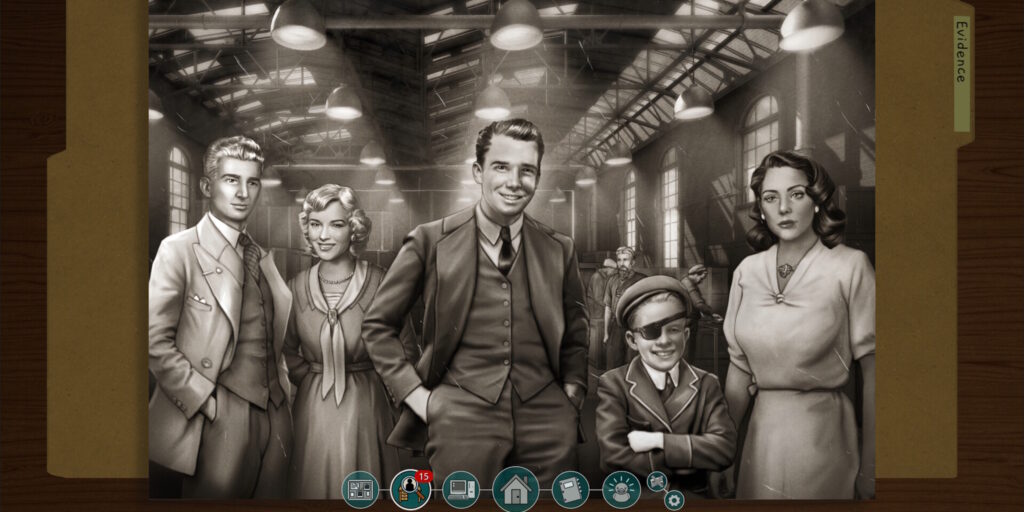Wes Anderson’s The Phoenician Scheme opens with the attempted assassination of international financier and industrialist Anatole “Zsa-Zsa” Korda (a delightfully dry Benecio del Toro). The year is 1950, and this is the sixth such attempt on the aircraft and munitions magnate’s notoriously durable life, for the record. Initially, it’s unclear what grievances Korda’s would-be killers might have against him. Do they represent the interests of envious business rivals, government agents, or Communist revolutionaries? Regardless, the bomb they’ve planted on board his private plane misses its mark, instead exploding his administrative assistant into a smear of red goo. (His sixth such assistant, for the record.)
Improbably yet characteristically, Korda survives the subsequent plane crash, but something is different about this latest (but not final) near-death experience. It jolts Korda into an episode of personal stock-taking and amends-making. However, this perpetually unperturbed captain of industry would never do anything so gauche as, say, renounce his wealth to go live as a monk on a mountaintop. Instead, Korda knits his death-kissed epiphany directly into his latest business plot: a convoluted, monumental, multi-partner development deal code-named – you guessed it – the Phoenician Scheme.
Korda makes a late adjustment to his usual entrepreneurial MO by involving his estranged eldest daughter, Liesl (Mia Threapleton), a no-nonsense novitiate who hasn’t seen a whisker of her father in six years. Still recovering from his injuries but raring to keep the Phoenician Scheme in motion, Korda pledges to acknowledge Liesl as his child and name her as heir to his personal fortune and business investments. (“On a trial basis,” he clarifies.) Liesl is justifiably skeptical of her father’s new leaf, but she agrees to play along for a while. Mostly she’s just hoping that she can curb the more morally indefensible aspects of the Scheme (such as all the slave labor) and perhaps bring her nine younger half-brothers back into the family fold.
In Anderson’s filmography, bad fathers run a close second to Death itself among the writer-director’s recurring fixations, and The Phoenician Scheme – notwithstanding the twisty financial and industrial skullduggery of its plot – represents a tidy integration of these two thematic strands. Korda is a classically negligent Anderson patriarch in the mold of Royal Tenenbaum, Steve Zissou, or the deceased father of the Whitman brothers in the Darjeeling Limited (2007). Admittedly, Korda’s self-awareness about his unsuitability for parenthood doesn’t come off as quite so nakedly self-serving, and his efforts to re-connect with Liesl seem genuine, if standoffish in their clipped pragmatism. Pleading apologies aren’t Korda’s style: He expresses his affection through his newfound but absolute confidence in Liesl’s resolve and intellect. (She is, after all, her father’s daughter.)
The story of The Phoenician Scheme is thus a tale of the gradual thawing of this relationship between a freshly conciliatory father and his reluctant adult child. The plot, however, is pure globe-trotting zaniness. It’s the closest that Anderson has come to fashioning an international thriller since The Grand Budapest Hotel (2014), although The Phoenician Scheme is bloodier, goofier, and less melancholy. It’s a cartoon version of a cloak-and-dagger corporate procedural, one that plays out in a romantic, never-was version of postwar North Africa. There are cheeky allusions to desert-set masterpieces like Casablanca (1942) and Lawrence of Arabia (1962), but, as in Asteroid City (2023), Anderson’s growing taste for over-the-top slapstick violence owes more to Looney Tunes than to TMC. (Hence the proliferation of dynamite, quicksand, ejector seats, and other accoutrements of Wile E. Coyote mayhem.)
Korda’s most pressing dilemma is the “Gap,” a massive funding shortfall in the Scheme that requires the mogul and his daughter to conduct a whirlwind tour to visit the project’s myriad investors and negotiate additional contributions. These partners include the Phoenician prince Farouk (Riz Ahmed); rail barons Leland (Tom Hanks) and Reagan (Bryan Cranston); nightclub owner Marseille Bob (Mathieu Amalric); ship-building magnate Marty (Jeffrey Wright); and hydroelectric engineer Hilda (Scarlett Johannson), who also happens to be Korda’s second cousin. None of these parties is especially interested in Korda’s fast-talking financial trickery, but the mogul has a habit of leveraging the emergent details of every scenario to his advantage. Of course, lurking at the bottom of the Phoenician Scheme’s accounting tables like a proverbial dragon is Korda’s diabolical half-brother, Nubar (Benedict Cumberbatch, going full Rasputin), who, not incidentally, may also be the villain responsible for the death of Liesl’s mother.
Along for the ride is the soft-spoken and socially awkward Bjørn (Michael Cera), a Norwegian entomologist initially retained by Korda out of intellectual curiosity but swiftly recruited as his new administrative assistant. Unsurprisingly, Bjørn soon falls in puppy-love with Liesl, although Cera’s high placement in the cast list hints that his character has a surprise or two up his tweedy sleeve. Meanwhile, a shadowy consortium of global business interests and strong-arm governments attempts to sabotage Korda’s efforts, both on and off screen. The overall result is one of the most charmingly manic films that Anderson has ever made, a postcard travelogue of whimsical locations and memorably daft characters. The episodic quality of Korda’s mission – as he marches through the on-screen checklist of Scheme investors, jumping through their idiosyncratic hoops and wheedling them to cover the Gap – provides a clear and winning structure that mitigates the feature’s breathless pace.
Anderson hasn’t entirely abandoned recognizable, real-world locales in his work, but starting with Grand Budapest, the filmmaker has increasingly leaned into fictional settings seemingly plucked from a parallel universe of literary and cinematic influences. (Even the exceptions prove the rule: The setting of 2021’s underrated anthology feature The French Dispatch owes less to reality than to the American conception of French art, cuisine, and politics as filtered through the movies.) The Phoenician Scheme continues this trend, as the titular “Western Near Eastern” nation is depicted via on-screen maps and coordinates that give it the veneer of an actual place. Yet Anderson and production designer Adam Stockhausen fix its cultural and aesthetic signifiers in a fanciful liminal space: not quite colonial, not quite post-colonial, its ancient name suggesting a land that is forgotten yet foundational.
All this is to say that the film’s setting is a bit more developed than, say, a glorified throwaway gag like Duck Soup’s (1933) fictional republic of Freedonia. Yet, perhaps not coincidentally, there’s also an undeniable streak of rapid-fire Marx Brothers wackiness to The Phoenician Scheme’s comedy. The screenplay by Anderson – with a story credit to longtime collaborator Roman Coppola – moves stock-ticker fast, featuring the kind of densely layered wordplay and droll callbacks-within-callbacks that will inevitably require repeat viewings. It’s easy to get lost in the vortex of relentless financial, legal, and political jargon, which might have been a problem in a film that is more concerned with the proximal drama of its international-thriller elements.
For Anderson, however, all the debt negotiations, Continental luxury, and outlandish assassination attempts are just an entertaining means to an end. Likewise the businessman’s near-death visions of a grayscale afterlife, which play like Defending Your Life (1991) as co-directed by Ingmar Bergman and Bob Clampett. (There’s no harp-strumming Porky Pig, but there might as well be.) As in most of Anderson’s features, the real story is about the simple yet fraught drama of human relationships: lovers, spouses, parents, children, siblings, and blended and adopted families of all sorts. The reconciliation between Korda and Leisl might be gentler and more straightforward than the angstier multi-character arcs in features like The Royal Tenenbaums (2001) or The Darjeeling Limited, but it’s conveyed with no less sincerity or sweetness.
Leisl expresses contempt for her father’s business practices and repeatedly asserts her desire to return to her convent, but Threapleton’s performance adds a touch of vulnerability to this starched defiance. While Leisl vocally protests her father’s shady actions, she dutifully follows him on his slightly deranged financial negotiations, ostensibly to keep the proceedings on an acceptably godly path (and to learn the truth about her mother’s death). Slowly, however, she warms to the eccentric, slightly constipated way that Korda expresses his regard. One key detail: The rosary, pipe, and souvenir dagger that Leisl carries are replaced one by one with ornate, jeweled duplicates gifted by Korda, representing her increasing acceptance of her father. Fundamentally, however, the conflict between the daughter’s moral conscience and the father’s power-hungry narcissism is an unresolvable paradox. There’s no inkling that Leisl will ultimately compromise her principles, which means that any concessions on the Phoenician Scheme – or the broader matter of their family’s future – will have to be on Korda’s end.
Given the feature’s Middle Eastern setting, heavenly judgment vignettes, and Korda’s repeated references to Nubar’s “biblical” evil, the Gospel-minded viewer might be put in mind of Matthew 19:24: It is easier for a camel to go through the eye of a needle, than for a rich man to enter into the kingdom of God. Anderson has always expressed a fascination with the lifestyle trappings of the wealthy, particularly those of the self-made nouveau riche and their second-generation progeny. (Or, at least, his own idiosyncratic expression of said trappings, as filtered through his often-parodied, never-duplicated mid-century aesthetic obsessions.) Yet that fascination is tempered with an acknowledgement that a pile of gold is a poor substitute for emotional well-being. Or, to put it another way, a three-story townhouse in Upper Manhattan means nothing without a family to fill its rooms and hallways with life.
Korda, for his part, seems less concerned with material wealth per se than the experiences it allows one to access: fine art, good food, and an opportunity to learn new things. (A ravenous autodidact, Korda is perpetually depicted with his nose in books on various esoteric topics, from North American fleas to medieval sacred erotica.) Granted, his ruthless capitalistic gambits seem to be driven in part by vanity. He takes pleasure in squeezing a financial partner for an additional 5 percent, just to prove he can do it. Yet The Phoenician Scheme is, at bottom, the tale of a previously self-satisfied man whose brushes with death have forced him to reassess what legacy looks like. Korda has spent his life shelling out for monolithic physical testaments to his heaven- and earth-moving might, like the pharaohs of old. Anderson’s feature flips the equation, asking how much of that legacy – the concrete, steel, and electrified prosperity – he would be willing to sacrifice to preserve something much smaller, and yet infinitely richer.
The Phoenician Scheme opens in select theaters on Friday, June 6.




